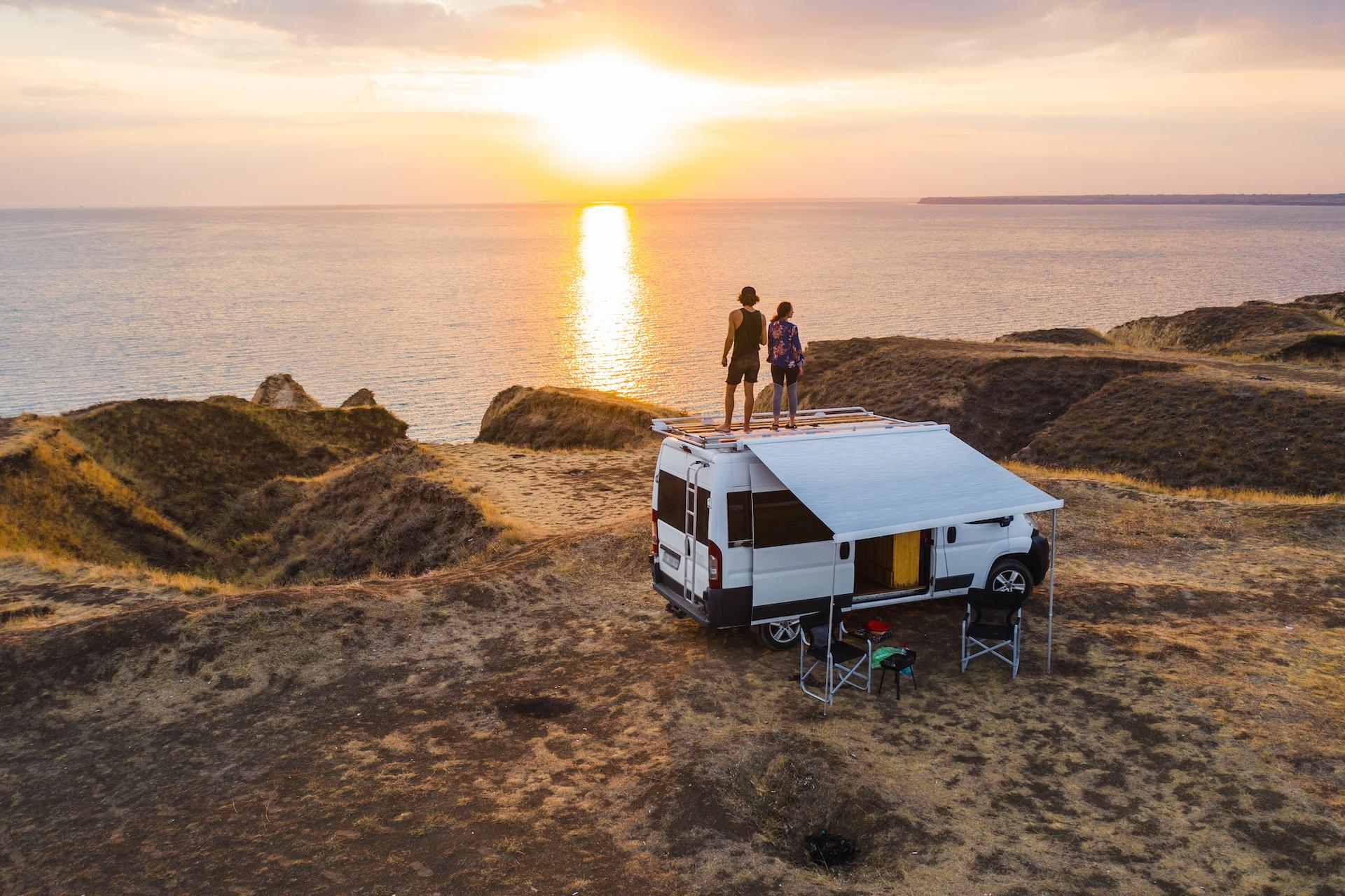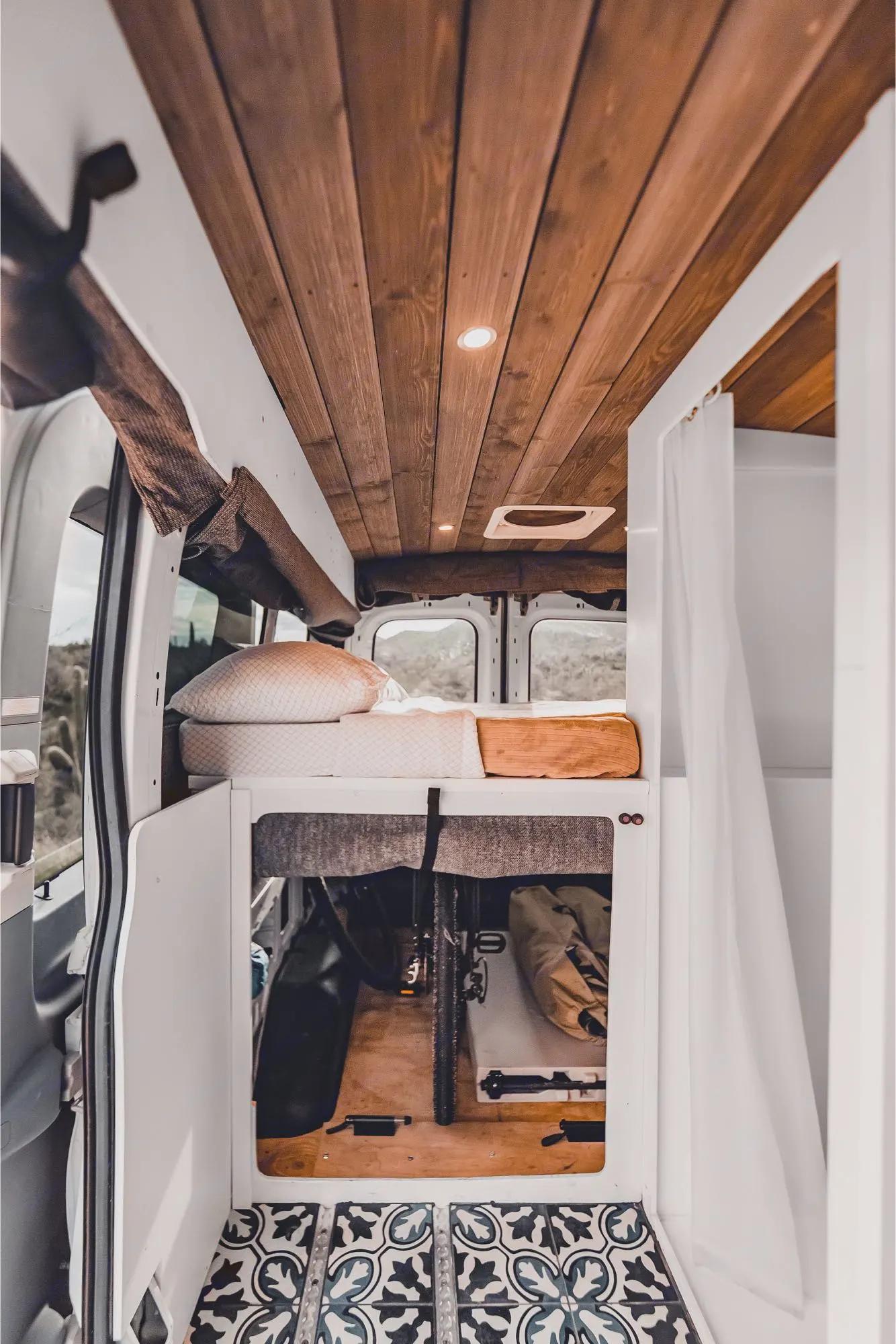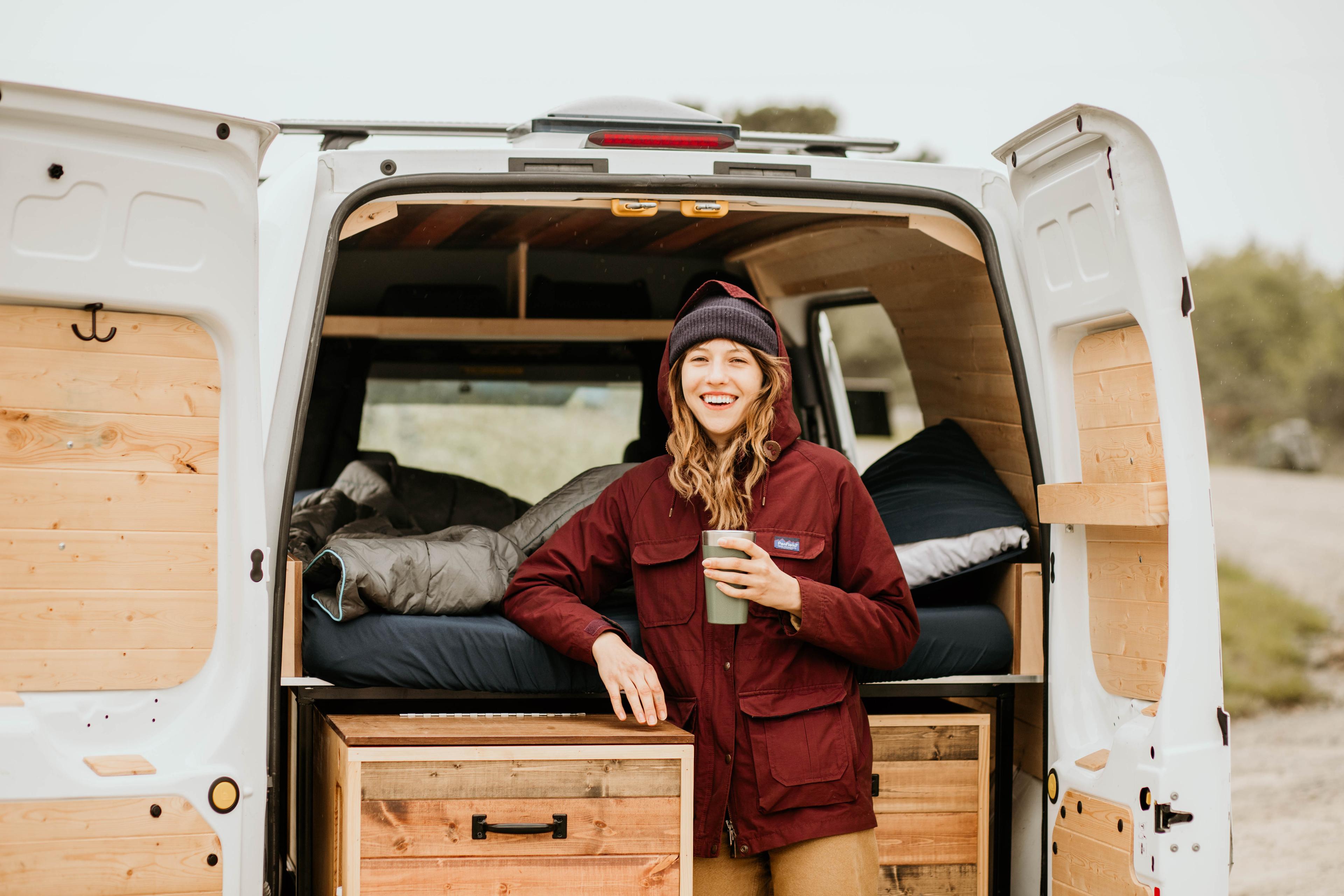Jul 23, 2024
How to Insure a Self-Built Campervan: Complete DIY Guide (2025)
How to Insure a Self-Built Campervan: Complete DIY Guide (2025)
A
By Aaron Ammar
Get specialized insurance for your DIY campervan build. Compare coverage options, costs, and companies that actually insure self-built conversions.
Common questions
Blog Post
Education

Yes, you can insure your self-built campervan, but it requires specialized RV insurance rather than standard auto coverage. Most DIY conversions qualify for Class B motorhome insurance once they include a permanent kitchen and sleeping area, though you'll need to document your build and work with insurers who specifically cover self-built conversions. Roamly and select other carriers now offer comprehensive coverage for DIY builds, protecting both your base vehicle and conversion investments that can easily reach $20,000-$50,000.
Building your dream van was the fun part—now comes securing the right insurance to protect your mobile home investment. Don't worry, we've all been there. Let's figure this out together so you can focus on the fun stuff: hitting the road with peace of mind.

Why Do Self-Built Campervans Need Special Insurance?
Standard auto insurance only covers your van as an empty cargo vehicle, not the thousands you invested in your conversion build. If you're in an accident, regular auto insurance might cover your van's base value but won't touch the $20,000+ in cabinets, lithium batteries, solar panels, and living amenities you've added.
The challenge? Many traditional insurers lack an understanding of DIY conversions. Some major insurance agents have never even been asked about insuring a self-built camper van and have no policies to cover them. They're comfortable with factory-built RVs from Winnebago or Airstream that meet RVIA manufacturing standards, but a self-built conversion? That's uncharted territory for most.
Here's what standard auto coverage typically excludes:
- Custom cabinetry and furniture
- Electrical systems (solar, batteries, inverters)
- Plumbing and fresh water systems
- Appliances and fixtures
- Personal belongings and gear
Real-world example: If someone breaks into your van and steals your laptop, clothes, and camping gear, standard RV insurance may not cover those personal belongings. You might need additional renters' or personal property coverage for complete protection.
Which Companies Actually Cover Self-Built Campervans?
The good news: more insurers are recognizing the DIY campervan market.
Roamly (Most Comprehensive for DIY Builds)
- Built by RVers for RVers, covering DIY campervans from day one across all U.S. states except Hawaii and Washington D.C.
- Covers unique RV situations like pest damage, vacation liability, and roof coverage
- Full replacement cost coverage for personal belongings up to $3,000
- Emergency expense coverage for lodging and meals if your van breaks down >50 miles from home
Companies That Generally DON'T Cover DIY Builds:
Based on recent consumer research, these major insurers typically decline self-built conversions:
- State Farm
- GEICO
- Allstate (varies by state and agent)
- USAA
- Farmers Insurance
Note: Policies vary by state, and individual agents may have different guidelines. Always confirm directly with insurers.
What Documentation Will You Need?
Every DIY build needs proper documentation to qualify for RV insurance coverage. Insurance companies want to verify your conversion meets motorhome standards and assess its value accurately.
Essential Documentation Checklist:
Build Documentation:
- Complete spreadsheet of all materials and components with costs
- Photos of major systems during installation (electrical, plumbing, etc.)
- Photos of completed interior and exterior
- Receipts for major components (solar, batteries, appliances)
- Vehicle registration and title
Professional Appraisal (Recommended): A certified campervan appraisal provides a Fair Market Value report, increasing your coverage if your van is damaged or stolen. Professional appraisals typically cost $300-500 but can save thousands in proper coverage.
Van Specifications Needed:
- Total cost (vehicle + build materials)
- Permanent fixtures: kitchen, bed, bathroom (if applicable)
- Electrical system details
- Fresh/gray water capacity
- Storage and living space layout
Pro tip: Start documenting from day one of your build. It's much easier than trying to recreate everything after the fact.

How Much Does DIY Campervan Insurance Cost?
Self-built campervan insurance typically costs $500-$1,600 annually, depending on your van's value, usage, and coverage level. This range reflects the unique nature of DIY builds and varies significantly based on factors like base vehicle type, conversion value, and how you use your van.
Cost Breakdown by Vehicle Type:
- Ford Transit builds: $600-$1,200/year (moderate repair costs)
- Mercedes Sprinter builds: $800-$1,600/year (premium parts, specialized service)
- Ram ProMaster builds: $500-$1,000/year (lower vehicle values, simpler systems)
Key Cost Factors:
Conversion Value & Type
- Professional conversions with documented values typically cost more to insure than DIY builds, but often qualify for better coverage options
- Higher-value builds ($50k+) require more comprehensive coverage
Usage Pattern
- Part-time/recreational: Lower premiums, standard RV coverage
- Full-time living: Full-time RV insurance ranges from $1,500 to $4,000 per year, treated similarly to homeowners' insurance
- Rental income: Requires specialized coverage for periods when renting
Geographic Location
- Urban areas: Higher premiums due to theft/damage risk
- Rural/camping-focused: Lower premiums
- State insurance requirements vary
Your Driving Record
- A clean driving history can save 20-30% on premiums
- Multiple violations significantly increase costs
What Coverage Types Do You Actually Need?
DIY campervan insurance combines elements of auto and homeowners insurance to protect your mobile lifestyle. Understanding each coverage type helps you choose the right protection level without overpaying. For a comprehensive overview of all available options, explore our complete guide to types of RV insurance plans.
Essential Coverage Types:
Liability Coverage (Required)
- Bodily injury and property damage liability - required in nearly every state before you can legally drive
- Recommended: Higher limits than state minimums due to larger vehicle size
- Covers damage/injury you cause to others
Collision Coverage
- Covers damage to your campervan in collisions with other vehicles or objects
- Essential for protecting your build investment
- Choose a deductible based on your financial comfort level
Comprehensive Coverage
- Protects against theft, vandalism, fire, and weather damage beyond your control
- Critical protection: RV thefts result in close to $50 million in insurance claims annually
- Covers glass damage, animal collisions
Personal Effects/Contents Coverage
- Covers personal items inside your campervan up to specified limits
- Separate from vehicle coverage - protects laptops, clothes, camping gear
- Roamly covers the full replacement cost of belongings up to $3,000
Emergency Expense Coverage
- Pays up to $750 for hotel and travel costs if your campervan breaks down more than 50 miles from home
- Essential for van life travelers
- Covers meals, lodging, and transportation while the van is being repaired
Vacation Liability (Optional)
- Coverage if someone is injured in or around your parked campervan while camping
- Important for full-time or extended camping
Full-Time Van Life Considerations:
If you live in your van more than 6 months per year, you'll need:
- Personal liability coverage, medical payments, and loss assessment options
- Higher personal property limits
- Continuous coverage (no seasonal suspension)
How to Get Coverage: Step-by-Step Process
Getting insured starts with choosing the right company and having your documentation ready. Here's the proven process that works:
Step 1: Gather Your Documentation
- Complete build cost spreadsheet
- High-quality photos of the finished conversion
- Vehicle title and registration
- Receipts for major components
Step 2: Contact Specialized Insurers First
Start with companies known to cover DIY builds:
Get a Roamly quote - specialists in unique RV situations
Step 3: Be Upfront About Your Build
- Always disclose that it's a self-built conversion
- Provide total invested value (vehicle + build)
- Explain your usage pattern (part-time vs. full-time)
- Describe safety features and security measures
Step 4: Compare More Than Just Price
Consider:
- Coverage comprehensiveness
- Claims handling reputation
- Customer service quality
- Specialized RV knowledge
- Emergency roadside assistance
Step 5: Consider Professional Appraisal
For builds over $30,000, a certified appraisal ensures proper coverage and can simplify claims processing.
Red Flags to Avoid
Some insurance situations should make you pump the brakes and ask more questions.
Warning Signs:
- The agent seems unfamiliar with RV/campervan insurance
- The quote seems unusually low for your build value
- The company wants to insure a "cargo van with equipment"
- No questions asked about your conversion details
- Coverage excludes "modifications" or "custom equipment"
Remember: Cheap insurance that won't cover your build isn't insurance at all—it's expensive paperwork.
Market Context: Why Now Is Different
The DIY campervan insurance landscape is rapidly evolving. With RV sales projected to reach $35.94 billion in 2025 and the RV insurance market expected to grow from $100 billion in 2023 to $147.75 billion by 2031, insurers are finally recognizing this market.
More options are becoming available, but specialized knowledge remains crucial for navigating this evolving landscape.
Ready to Protect Your Build?
Don't let all that hard work and investment hit the road unprotected. Your self-built campervan deserves coverage that actually gets what you've created.
Take action today. Start Your DIY Campervan Quote - Get coverage built for van life in minutes
During the build phase, maintain regular auto insurance on your base vehicle. Once your conversion is complete with kitchen and sleeping areas, you can switch to RV insurance. Document your build progress—you'll need photos and receipts for the insurance application.
Yes, but you'll need specialized full-time RV insurance. Full-time policies include additional coverages like personal liability and medical payments, treating your RV similarly to homeowners' insurance. These policies cost more but provide broader protection for van life living.
It depends on your coverage type and documentation. Replacement cost coverage pays to rebuild/repair with new materials, while actual cash value factors in depreciation. Roamly offers full replacement cost coverage for personal belongings, and some policies extend this to custom-built components with proper documentation.
Most personal RV policies exclude commercial use, including rentals. If you plan to rent your van through platforms like Outdoorsy or Turo, you'll need commercial coverage or a policy that specifically allows occasional rentals. Check with your insurer before listing your van for rent.
Yes, if your conversion includes permanently installed kitchen facilities and sleeping accommodations. Once you add a kitchen and sleeping area, your vehicle may be classified as a Class B motorhome and insured with an RV policy. Most insurers require both elements to qualify for motorhome coverage.
Roamly Insurance Group, LLC ("Roamly") is a licensed general agent for affiliated and non-affiliated insurance companies. Roamly is licensed as an agency in all states in which products are offered. Roamly license numbers. Availability and qualification for coverage, terms, rates, and discounts may vary by jurisdiction. We do not in any way imply that the materials on the site or products are available in jurisdictions in which we are not licensed to do business or that we are soliciting business in any such jurisdiction. Coverage under your insurance policy is subject to the terms and conditions of that policy and is ultimately the decision of the buyer.
Policies provided by Roamly are underwritten by Spinnaker Insurance Company, Progressive Insurance Company, Safeco Insurance Company, Foremost Insurance Company, National General Insurance, Mobilitas Insurance Company, and others.
Connect
© 2026 Roamly All rights reserved.
